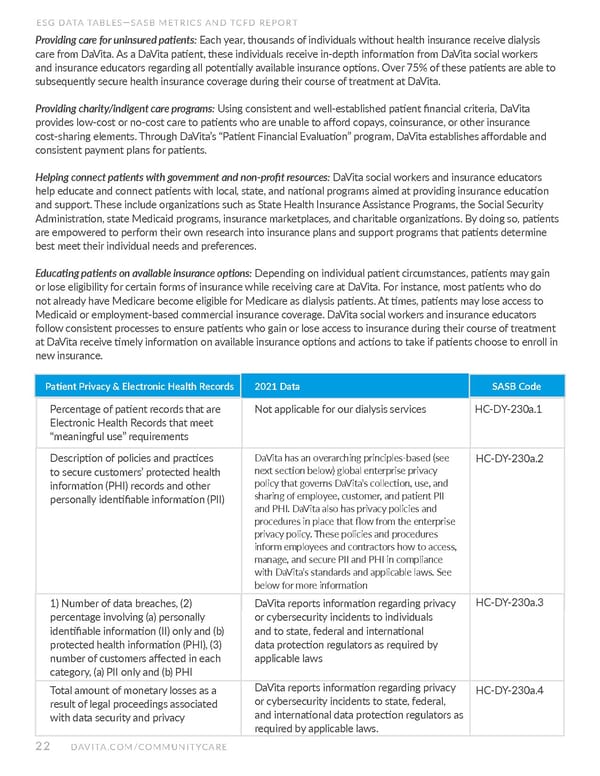Providing care for uninsured patients: Each year, thousands of individuals without health insurance receive dialysis care from DaVita. As a DaVita patient, these individuals receive in-depth information from DaVita social workers and insurance educators regarding all potentially available insurance options. Over 75% of these patients are able to subsequently secure health insurance coverage during their course of treatment at DaVita. Providing charity/indigent care programs: Using consistent and well-established patient financial criteria, DaVita provides low-cost or no-cost care to patients who are unable to afford copays, coinsurance, or other insurance cost-sharing elements. Through DaVita’s “Patient Financial Evaluation” program, DaVita establishes affordable and consistent payment plans for patients. Helping connect patients with government and non-profit resources: DaVita social workers and insurance educators help educate and connect patients with local, state, and national programs aimed at providing insurance education and support. These include organizations such as State Health Insurance Assistance Programs, the Social Security Administration, state Medicaid programs, insurance marketplaces, and charitable organizations. By doing so, patients are empowered to perform their own research into insurance plans and support programs that patients determine best meet their individual needs and preferences. Educating patients on available insurance options: Depending on individual patient circumstances, patients may gain or lose eligibility for certain forms of insurance while receiving care at DaVita. For instance, most patients who do not already have Medicare become eligible for Medicare as dialysis patients. At times, patients may lose access to Medicaid or employment-based commercial insurance coverage. DaVita social workers and insurance educators follow consistent processes to ensure patients who gain or lose access to insurance during their course of treatment at DaVita receive timely information on available insurance options and actions to take if patients choose to enroll in new insurance. Percentage of patient records that are Electronic Health Records that meet “meaningful use” requirements Not applicable for our dialysis services Description of policies and practices to secure customers’ protected health information (PHI) records and other personally identifiable information (PII) DaVita has an overarching principles-based (see next section below) global enterprise privacy policy that governs DaVita’s collection, use, and sharing of employee, customer, and patient PII and PHI. DaVita also has privacy policies and procedures in place that flow from the enterprise privacy policy. These policies and procedures inform employees and contractors how to access, manage, and secure PII and PHI in compliance with DaVita’s standards and applicable laws. See below for more information 1) Number of data breaches, (2) percentage involving (a) personally identifiable information (II) only and (b) protected health information (PHI), (3) number of customers affected in each category, (a) PII only and (b) PHI DaVita reports information regarding privacy or cybersecurity incidents to individuals and to state, federal and international data protection regulators as required by applicable laws Total amount of monetary losses as a result of legal proceedings associated with data security and privacy DaVita reports information regarding privacy or cybersecurity incidents to state, federal, and international data protection regulators as required by applicable laws. Patient Privacy & Electronic Health Records 2021 Data SASB Code HC-DY-230a.1 HC-DY-230a.2 HC-DY-230a.3 HC-DY-230a.4 22 DAVITA.COM/COMMUNITYCARE ESG DATA TABLES—SASB METRICS AND TCFD REPORT
 DaVita Kidney Care ESG Report Page 21 Page 23
DaVita Kidney Care ESG Report Page 21 Page 23